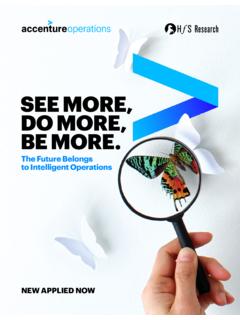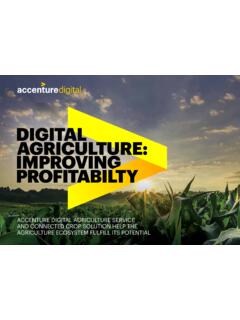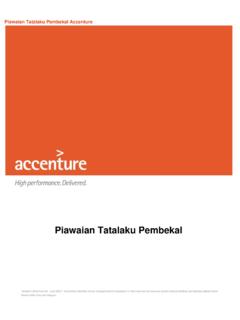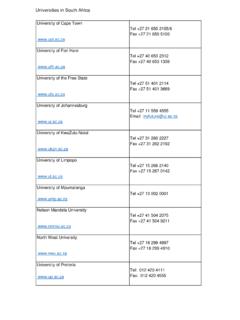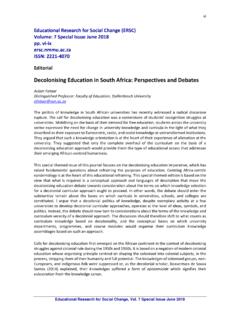Transcription of Artificial Intelligence is South Africa Ready? | Accenture
1 IS South Africa Ready? INTELLIGENCEThe world around us is changing at a furious pace. It s left many established businesses shaken, with executives questioning their organisations longevity. To participate in a digital future, business transformation is critical and increasingly urgent. A strategic approach is essential. To help businesses chart the way forward, Accenture has partnered with the Gordon Institute of Business Science (GIBS) to provide insight into digital technologies and the future of OF CONTENTSINTRODUCTION 4SO WHAT, EXACTLY, IS AI? 5 WHY DO WE NEED AI? 8 WHAT S HOLDING South Africa BACK?
2 10 FORGING A PATH TO AN AI FUTURE - What Must South Africa Do Now? 12 NEXT STEPS FOR POLICY MAKERS AND BUSINESS LEADERS 16 CONCLUSION: AI In South Africa ? 20 INTRODUCTIONARTIFICIAL Intelligence (AI) IS TRANSFORMING THE WAY WE LIVE AND WORK - LIKE NEVER BEFORE. BUT IN South Africa , WHERE THE ADOPTION OF DIGITAL TECHNOLOGIES HAS BEEN SLUGGISH, A TROUBLING QUESTION LINGERS: WILL THE COUNTRY BE LEFT OUT OF THE AI TRANSFORMATION? By most estimates, AI will create a market worth over $35 billion by 2025 and double annual economic growth rates, promising a future of robots and humans working together to solve the world s most difficult problems side by side and armed with near-unlimited processing and algorithmic power.
3 In South Africa , the southernmost country in Africa with a population of more than 55 million people, companies find themselves encumbered by legacy technologies and systems, business models, and corporate structures, as well as sunk investments in antiquated infrastructure all with workforces that may not be ready for the AI revolution that is already underway across the globe. Indeed, like many workers in other countries, South Africans are concerned that AI will eliminate their jobs and even worsen income inequality. While many South African organisations have begun to embrace the potential of AI, more work remains. This report looks at South Africa s readiness to compete in an AI-driven world and offers recommendations to all stakeholders in the ecosystem on how to start preparing to address the challenges and opportunities presented by AI.
4 Before they can do so, they must first understand what AI 4SO WHAT, EXACTLY 5SO WHAT, EXACTLYIS AI?BY ITS SIMPLEST DEFINITION, AI COMPRISES DIFFERENT TECHNOLOGIES THAT CAN BE COMBINED IN DIFFERENT WAYS TO SENSE, COMPREHEND, ACT AND LEARN (THINK BIG DATA COUPLED WITH CLOUD CONNECTIVITY AND THE INTERNET OF THINGS). In practical terms, what this means is working with machines to do our jobs better, create greater efficiencies and drive economic growth. From autonomous driving vehicles to live translations made possible by Artificial neural networks, AI is making everything simpler and smarter. Three key factors are enabling AI to flourish in recent years: (1) quantum leaps in computing power, driven by the growth of cloud computing; (2) growth in Big Data, which has seen a compound annual growth rate (CAGR) of more than 50 percent since 2010 as more devices have become connected; and (3) significant investments in research and development (R&D) of basic AI technologies.
5 Some emerging AI technologies include computer vision, audio processing, natural-language processing, machine learning and expert systems. These self-directed, self-adaptive technologies combine with data-mining and pattern-recognition, among others, to enable AI solutions such as: Virtual agents online chatbots taking the place of call-centre agents and sales-support personnel; Cognitive robotics robots that can learn from experiences, the environment, and on their own; Speech analytics software that recognises speech patterns to identify emotions and stress to improve communication, guide interactions and extract information; Identity analytics solutions that help define access to critical data and systems based on information from authoritative systems; and Recommendation systems social-media marketing and content targeting.
6 And Data virtualisation retrieval and manipulation of data by an app, regardless of its format or where it is WHAT, EXACTLY 6AI TECHNOLOGIESILLUSTRATIVE SOLUTIONSS enseComprehendActMachine LearningKnowledge representaionNatural Language ProcessingAudio ProcessingVirtual AgentsIdentity AnalyticsCongnitive RoboticsSpeech AnalyticsRecommendation Systems Computer Vision Expert SystemsEMERGING AI TECHNOLOGIES Data VisualisationSource: Accenture analysisGETTING EQUAL TO 7 WHY DO WE NEED AI? 8 WHY DO WE NEED AI?EVERY YEAR, Accenture S TECHNOLOGY VISION RESEARCH IDENTIFIES EMERGING TECHNOLOGY TRENDS AND PREDICTIONS THAT WILL DISRUPT BUSINESS OVER THE NEXT THREE TO FIVE YEARS. In our 2017 research, we predict that in five years, more than half of consumers and enterprise clients will select products and services based on a company s AI, instead of that company s traditional brand.
7 And in seven years, most interfaces will not have a screen and will be integrated into daily tasks. These two predications alone strongly suggest that companies must act now on developing their AI DO WE NEED AI? 9IN ADDITION, THREE KEY TRENDS BORN FROM Accenture S TECHNOLOGY VISION WILL DEFINE A FUTURE IN WHICH AI WILL BE A KEY DRIVING COMPONENT: An adaptive workforce: The bureaucratic management model (which is based on fixed roles and rules designed for times of stable markets and long-term project planning) is a thing of the past. Rather an agile core of workers that help foster innovation and organisational change needed for companies to turn themselves into truly digital businesses. Ecosystem power plays: The integration of core business functionalities with third parties and platforms to provide more personalised service to customers.
8 These new ecosystems will unlock strategic growth and help design future value chains that will change businesses, products, and even the market itself. AI as the new UI: A takeover by AI of most user, customer, employee and partner experiences, in the form of natural interfaces voice, gesture, touch, natural language processing. To be sure, these will replace browser-based systems. With deep-learning algorithms, contextual analysis and image-recognition-enabling technology to constantly adapt, AI aligns itself to the wants and needs of the user. In other words, AI becomes the face of a company s digital brand, HR division and more. In fact, most executives agree that AI will revolutionise the way they gain information from and interact with customers.
9 In South Africa , some 78% of South African executives say they need to boost their organisation s competitiveness by innovating through investments in AI technologies, notably embedded AI solutions and computer vision. But the reality, though, is that only about a third of these organisations are planning significant AI investments over the next three July 2017 roundtable discussion on AI in South Africa hosted by Accenture and GIBS Business School revealed myriad concerns, including data quality, data privacy, workforce readiness and re-skilling, and potential job losses. AI AUTOMATES REPETITIVE TASKS .. BUT IS THERE ROOM FOR ALL EMPLOYEES? NOTED ONE ROUNDTABLE ATTENDEE. Indeed, rather than replacing humans, AI should make people more productive, other attendees said.
10 And organisations implementing AI solutions should bear the burden of reskilling its workforce. Inclusive economic growth must be a driver. Beyond the average worker, greater organisational competency in data sciences is needed at the C-Suite level in South Africa for AI to reach its potential, they said. But there s a role to play for policymakers and governments in encouraging the adoption and implementation of AI as well. For example, data privacy should be regulated and sooner rather than later, attendees the end, though, everyone agreed that South Africa must build competencies to participate in an AI-driven future. Yet numerous structural deficiencies remain, hampering South Africa s ability to fully integrate new technologies into the economy.
